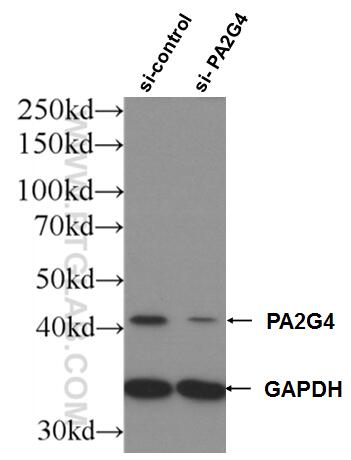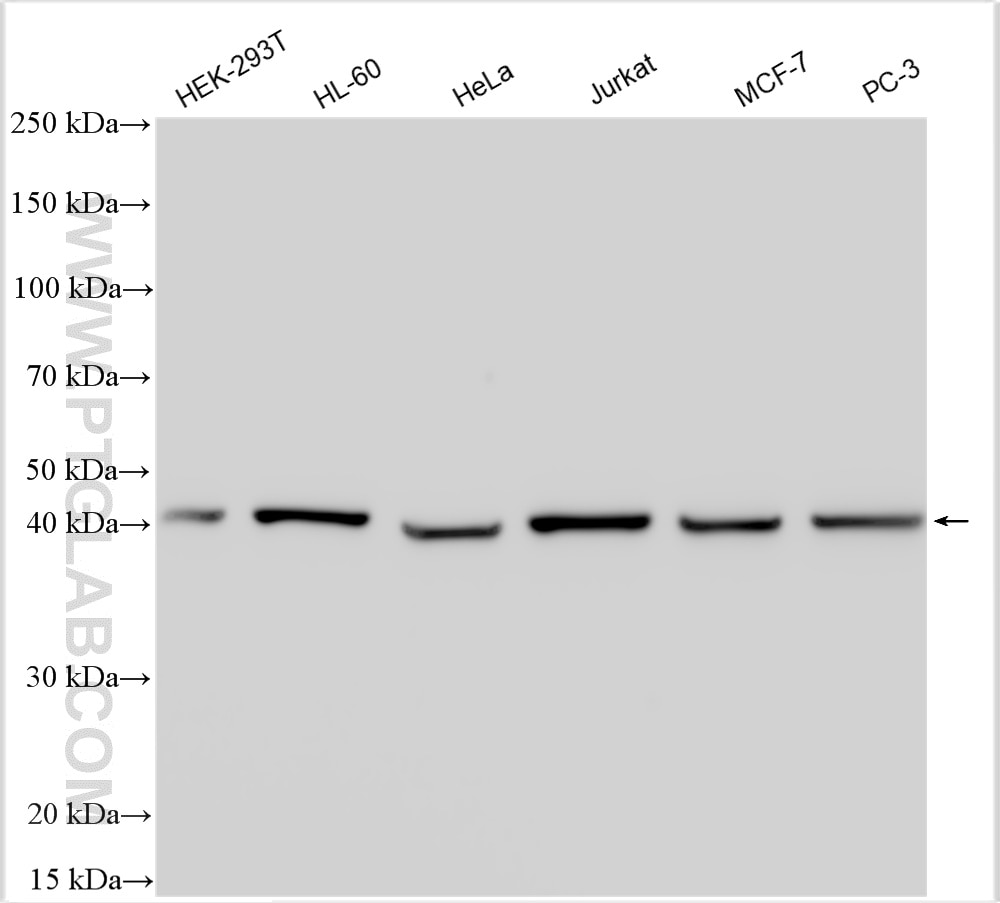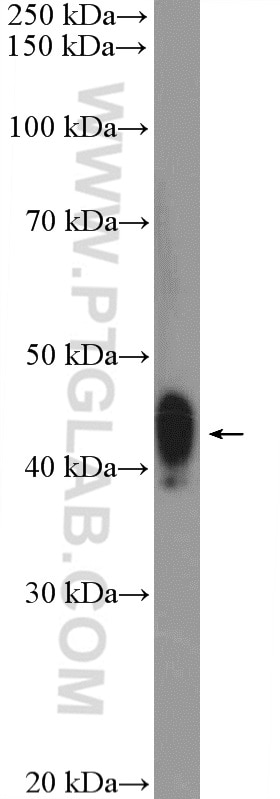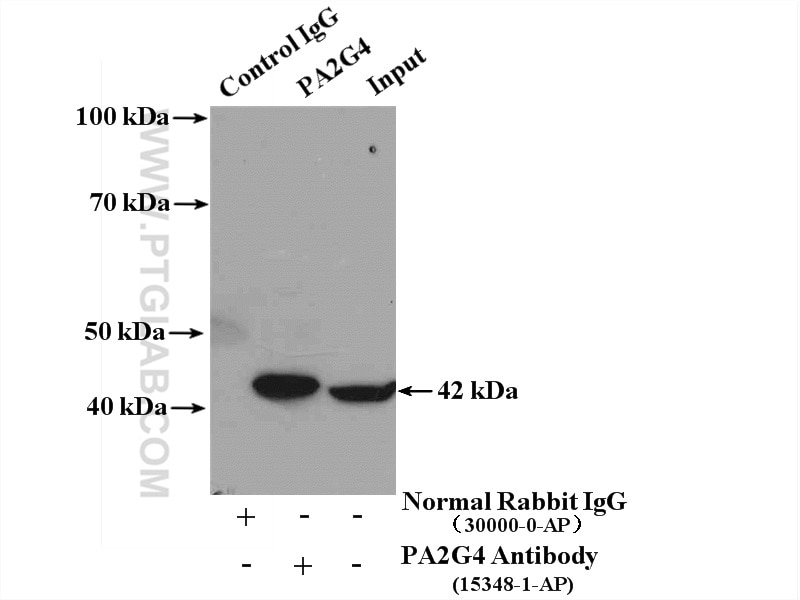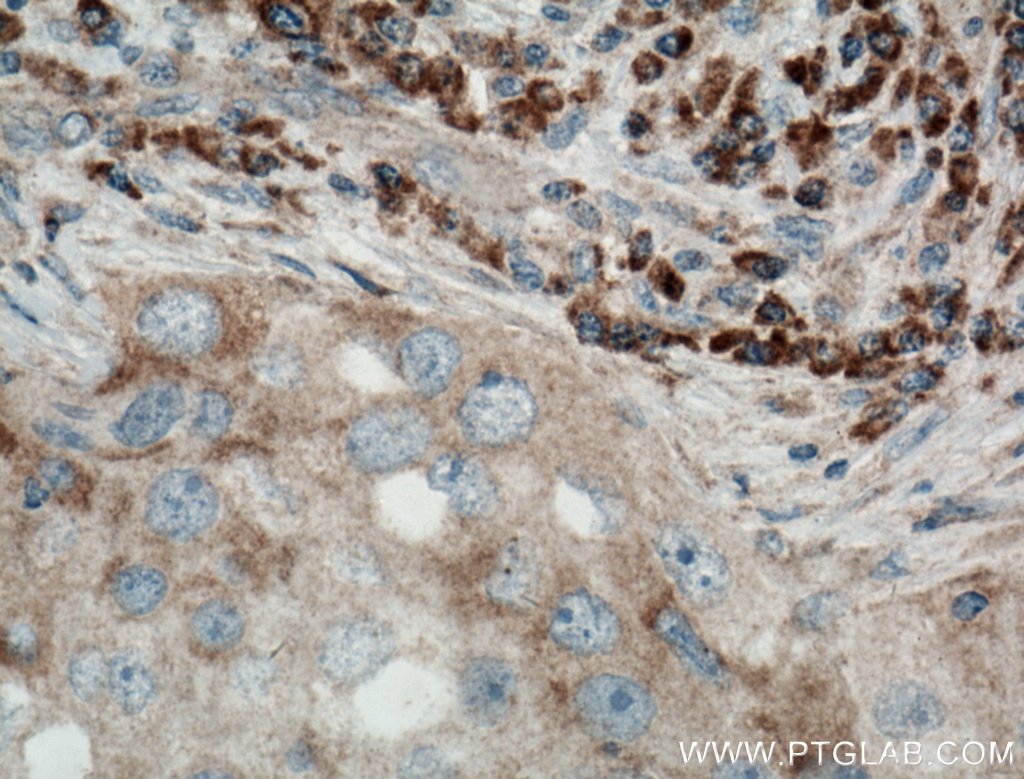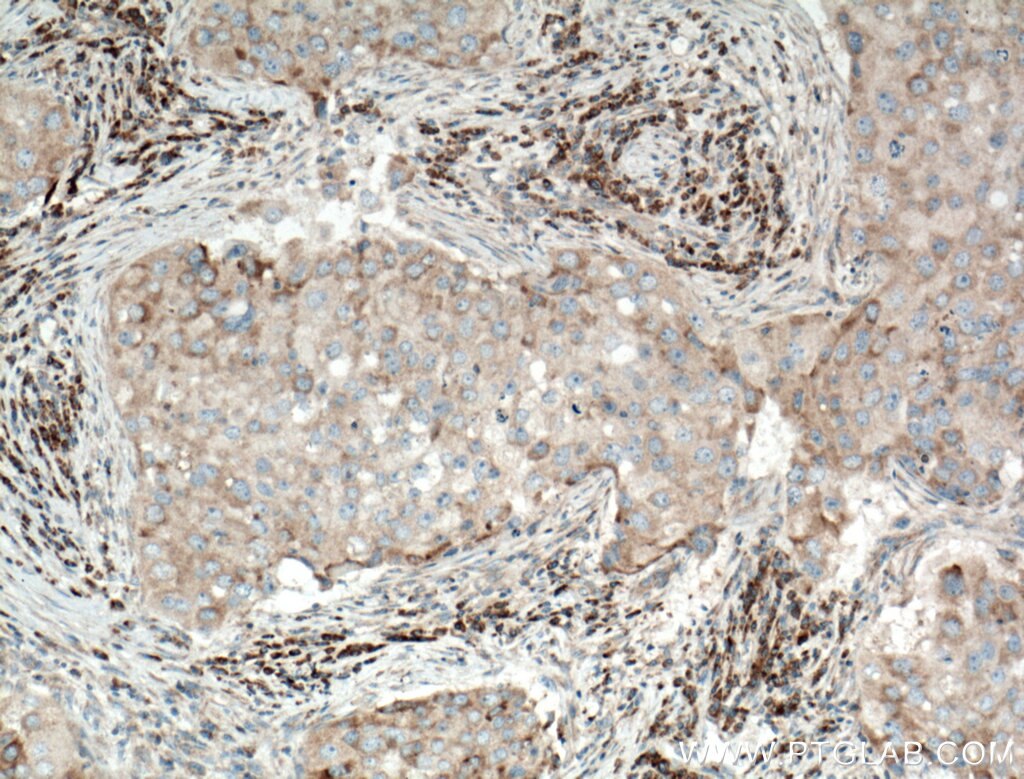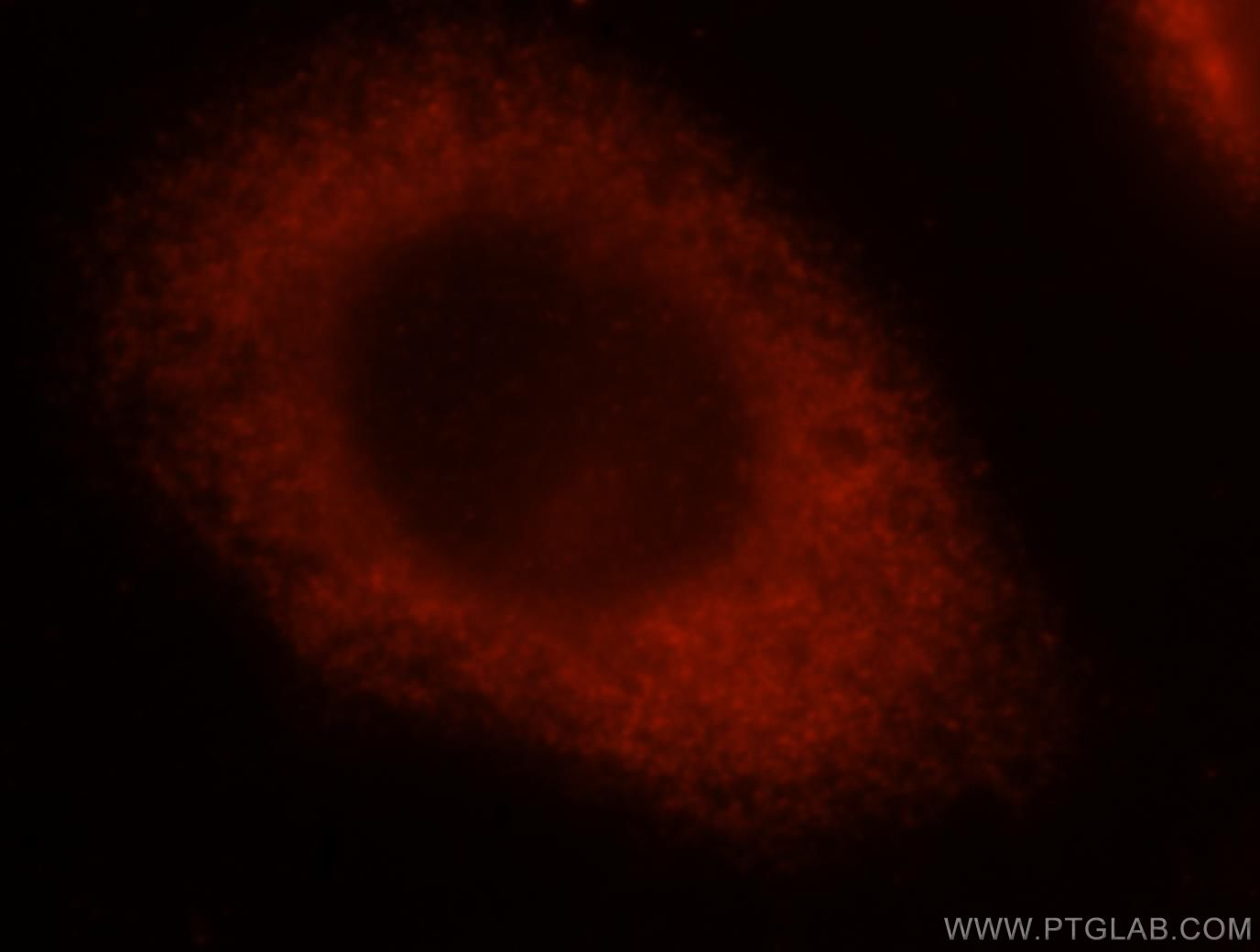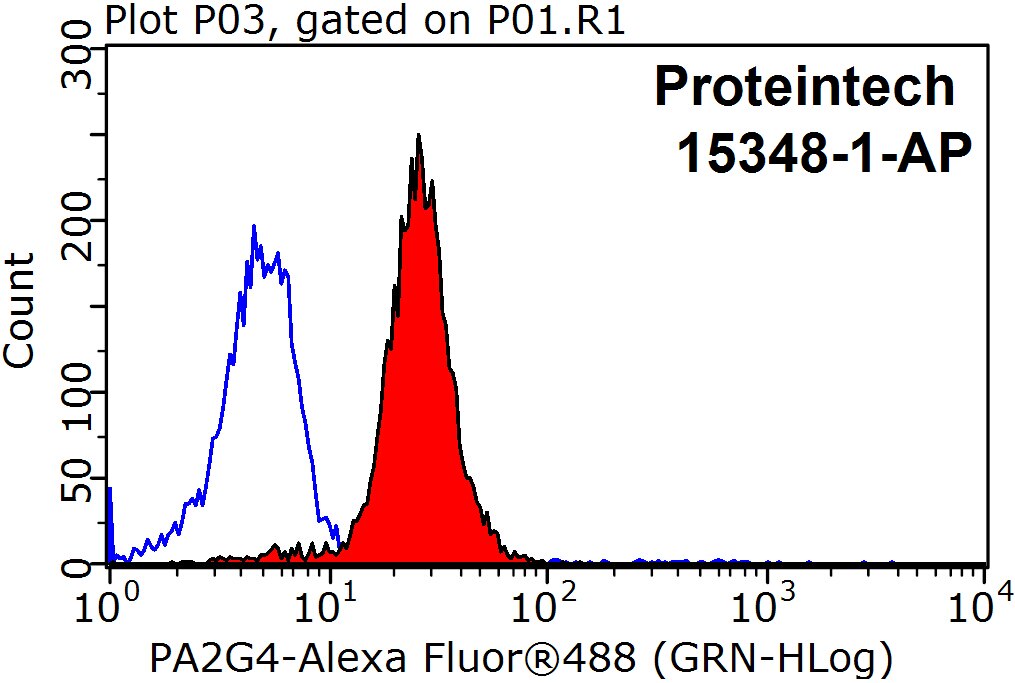- Featured Product
- KD/KO Validated
PA2G4 Polyklonaler Antikörper
PA2G4 Polyklonal Antikörper für FC, IF, IHC, IP, WB, ELISA
Wirt / Isotyp
Kaninchen / IgG
Getestete Reaktivität
human, Maus, Ratte
Anwendung
WB, RIP, IP, IHC, IF, FC, ELISA
Konjugation
Unkonjugiert
Kat-Nr. : 15348-1-AP
Synonyme
Galerie der Validierungsdaten
Geprüfte Anwendungen
| Erfolgreiche Detektion in WB | HEK-293T-Zellen, HEK-293-Zellen, HeLa-Zellen, HL-60-Zellen, Jurkat-Zellen, MCF-7-Zellen, PC-3-Zellen, Rattenmilzgewebe |
| Erfolgreiche IP | Jurkat-Zellen |
| Erfolgreiche Detektion in IHC | humanes Mammakarzinomgewebe Hinweis: Antigendemaskierung mit TE-Puffer pH 9,0 empfohlen. (*) Wahlweise kann die Antigendemaskierung auch mit Citratpuffer pH 6,0 erfolgen. |
| Erfolgreiche Detektion in IF | MCF-7-Zellen |
| Erfolgreiche Detektion in FC | MCF-7-Zellen |
Empfohlene Verdünnung
| Anwendung | Verdünnung |
|---|---|
| Western Blot (WB) | WB : 1:1000-1:6000 |
| Immunpräzipitation (IP) | IP : 0.5-4.0 ug for 1.0-3.0 mg of total protein lysate |
| Immunhistochemie (IHC) | IHC : 1:50-1:500 |
| Immunfluoreszenz (IF) | IF : 1:10-1:100 |
| Durchflusszytometrie (FC) | FC : 0.20 ug per 10^6 cells in a 100 µl suspension |
| It is recommended that this reagent should be titrated in each testing system to obtain optimal results. | |
| Sample-dependent, check data in validation data gallery | |
Veröffentlichte Anwendungen
| KD/KO | See 1 publications below |
| WB | See 3 publications below |
| IHC | See 2 publications below |
| IF | See 2 publications below |
| IP | See 1 publications below |
| RIP | See 1 publications below |
Produktinformation
15348-1-AP bindet in WB, RIP, IP, IHC, IF, FC, ELISA PA2G4 und zeigt Reaktivität mit human, Maus, Ratten
| Getestete Reaktivität | human, Maus, Ratte |
| In Publikationen genannte Reaktivität | human |
| Wirt / Isotyp | Kaninchen / IgG |
| Klonalität | Polyklonal |
| Typ | Antikörper |
| Immunogen | PA2G4 fusion protein Ag7587 |
| Vollständiger Name | proliferation-associated 2G4, 38kDa |
| Berechnetes Molekulargewicht | 44 kDa |
| Beobachtetes Molekulargewicht | 42 kDa, 48 kDa |
| GenBank-Zugangsnummer | BC001951 |
| Gene symbol | PA2G4 |
| Gene ID (NCBI) | 5036 |
| Konjugation | Unkonjugiert |
| Form | Liquid |
| Reinigungsmethode | Antigen-Affinitätsreinigung |
| Lagerungspuffer | PBS mit 0.02% Natriumazid und 50% Glycerin pH 7.3. |
| Lagerungsbedingungen | Bei -20°C lagern. Nach dem Versand ein Jahr lang stabil Aliquotieren ist bei -20oC Lagerung nicht notwendig. 20ul Größen enthalten 0,1% BSA. |
Hintergrundinformationen
PA2G4 (EBP1), first identified as an ErbB3 binding protein, is a 38 kDa protein that is widely expressed in cultured cells and tissues. The presence of several functional domains such as a nuclear localization sequence (NLS), LxxLL and LxCxE suggests the involvement of Ebp1 in cell signaling pathways and gene transcription regulation. This antibody is a rabbit polyclonal antibody raised against full length PA2G4 of human origin.
Protokolle
| Produktspezifische Protokolle | |
|---|---|
| WB protocol for PA2G4 antibody 15348-1-AP | Protokoll herunterladen |
| IHC protocol for PA2G4 antibody 15348-1-AP | Protokoll herunterladen |
| IF protocol for PA2G4 antibody 15348-1-AP | Protokoll herunterladen |
| IP protocol for PA2G4 antibody 15348-1-AP | Protokoll herunterladen |
| FC protocol for PA2G4 antibody 15348-1-AP | Protokoll herunterladen |
| Standard-Protokolle | |
|---|---|
| Klicken Sie hier, um unsere Standardprotokolle anzuzeigen |
Publikationen
| Species | Application | Title |
|---|---|---|
Cell Biosci PA2G4 promotes the metastasis of hepatocellular carcinoma by stabilizing FYN mRNA in a YTHDF2-dependent manner.
| ||
FASEB J Evidence for a fragile X messenger ribonucleoprotein 1 (FMR1) mRNA gain-of-function toxicity mechanism contributing to the pathogenesis of fragile X-associated premature ovarian insufficiency | ||
Methods Enzymol Selective ribosome profiling as a tool to study interactions of translating ribosomes in mammalian cells | ||
J Dent Sci Proliferation-associated 2G4 P48 is stabilized by malignant T-cell amplified sequence 1 and promotes the proliferation of head and neck squamous cell carcinoma |
